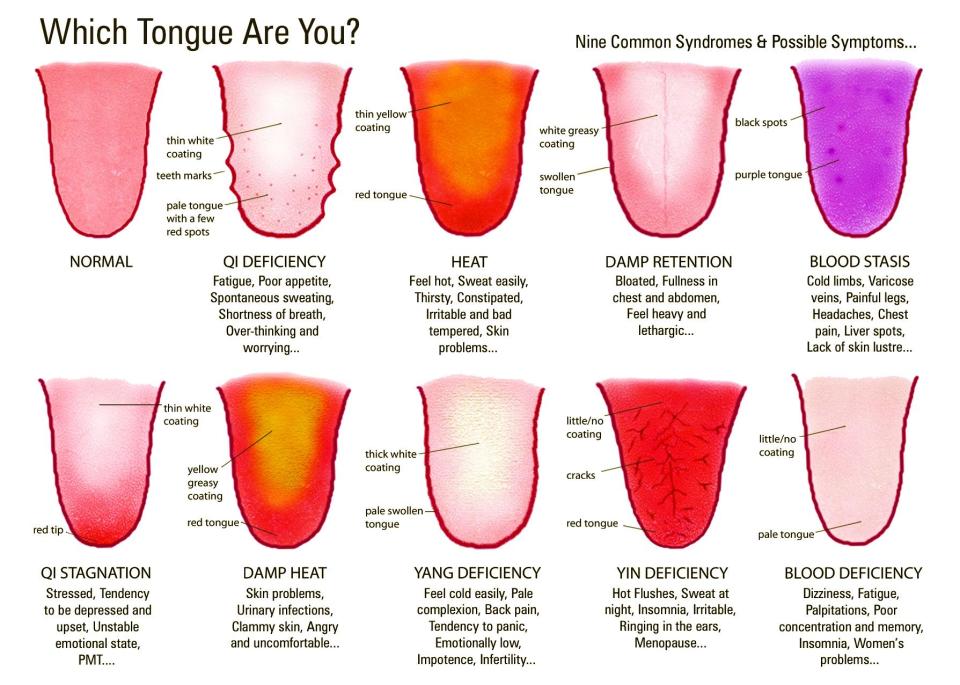How your tongue can show signs of gut problems and why you should scrape it every day

With the rise of the wellness movement, we're all suddenly buffing, scrubbing and cupping every inch of our bodies, to detoxify, purify and realign.
The latest self-care accessory to invest in? A tongue scraper.
But while some dismiss the ritual as just another self-care faff, Maeve O'Sullivan and Emilia Herting, who are Traditional Chinese Medicine (TCM) practitioners at Escapada health clinics, point out it's a good way of monitoring your overall health.
After all, the tongue has been used for thousands of years in both Ayurveda, the traditional Indian medicine system, and TCM as a non-invasive way of assessing your inner health.
"Keeping an eye on the state of your tongue increases your awareness of your overall health. In Chinese Medicine, it is believed that the tongue is a microcosm of the entire body and by looking at the shape, colour, coating and texture you are able to see any imbalances and deficiencies in the body," O'Sullivan and Herting say.
They recommend scraping your tongue regularly to clear toxins and bacteria. An added bonus is that removing the coating can prevent bad breath and eliminate undigested food particles.
How to scrape your tongue
How many times per day should you scrape your tongue?
"We recommend scraping your tongue once a day, making it a part of your normal oral cleansing routine alongside brushing your teeth and using a Neti Pot to cleanse the nasal passages."
Can you damage your tongue by being too rough?
"The tongue is resilient, but scraping too hard and too often will cause local trauma to the tongue so gently and regularly is the best technique."
Is it better to use a plastic or copper tongue scraper?
"For environmental reasons, we recommend copper or stainless steel tongue scrapers, as they are also easier to clean. Tongue scrapers are inexpensive and can be found in most health food stores or online."
Can you use a spoon or just a toothbrush?
"Research has shown that a scraper is more effective to remove all debris on the tongue than a toothbrush. Brushing will loosen and move debris around the mouth, but will not remove the bacteria from the tongue. The scraping action of a tongue scraper collects and removes the tongue coating which is where our oral bacteria lives."
How best to scrape your tongue:
"Standing in front of a mirror, hold the two ends of your scraper in both hands. Stick out your tongue and place the scraper as far back on your tongue as possible. With firm, but gentle pressure scrape the surface of your tongue in one long stroke. Rinse the scraper under the tap until it is clean and repeat 5-10 times, until your tongue feels clean and is completely free of its coating."
And if you're in the market for a fancy one, wellness guru Jasmine Hemsley, who also swears by the ritual, has designed her own copper Tongue Tingler.
A post shared by Jasmine Hemsley 🍯 (@jasminehemsley) on Jan 9, 2019 at 3:57am PST
How to read your tongue
If you're interested in what your tongue says about your overall health, the practitioners shared some tips on how to read possible symptoms on your own tongue. The main thing to know is that each part of the tongue corresponds to different internal organs, just like how feet are used in Reflexology. "The tongue is a mirror of the body's digestive system so can reflect food intolerances and sensitivities, gut problems, toxin levels, weak digestion and more," say O'Sullivan and Herting. You can inspect it yourself using good natural light. The tongue also needs to be relaxed so ensure that you only stick out your tongue for short intervals at a time. The chart below, by AcuMedic Clinic (London), gives an idea of some common possible indicators you should be looking out for, however it's important to note this is a simplistic representation of tongue diagnosis. The Escapada practitioners shared a list of indicators and possible symptoms to consider when performing a tongue diagnosis: Tongue Shape: Tongue Coating: Tongue Colour: Once O'Sullivan and Herting have diagnosed a patient's tongue, if necessary, they will go on to recommend therapies and treatments like acupuncture. For more information on Escapada's health clinics offering Chinese medicine, acupuncture and retreats, head to escapadaretreat.com

What to look out for
If the tongue is puffy with teeth marks it indicates a lack of nutrients and moisture. There could be blood stagnation and toxic buildup in the body as well.
A very thin tongue could indicate dehydration or that a chronic condition has left the body severely depleted.
A thick coating reflects a more serious condition and poor gut health.
A thin coating is normal, but a very thin or absent tongue coating means a lack of body fluids, or it could be a sign that the body is being taxed greatly.
A yellow coating signals heat and/or infection in the body.
A grey or black coating indicates that something is very wrong with the body’s health.
A thick white coating means there is cold in the body, likely poor circulation and possibly a yeast infection.
A red tongue may indicate heat in the body, such as a fever or a hormonal imbalance that is leading to hot flashes or temperature changes.
A purple tongue is a sign that the circulatory system is backed up, perhaps from a major injury or pain condition. There may also be inflammation or infection in the body.
A pale tongue is a sign of a deficiency or a lack of energy. This is common with anaemia or after a long-standing disease where the immune system is weak.


